DBQ
advertisement
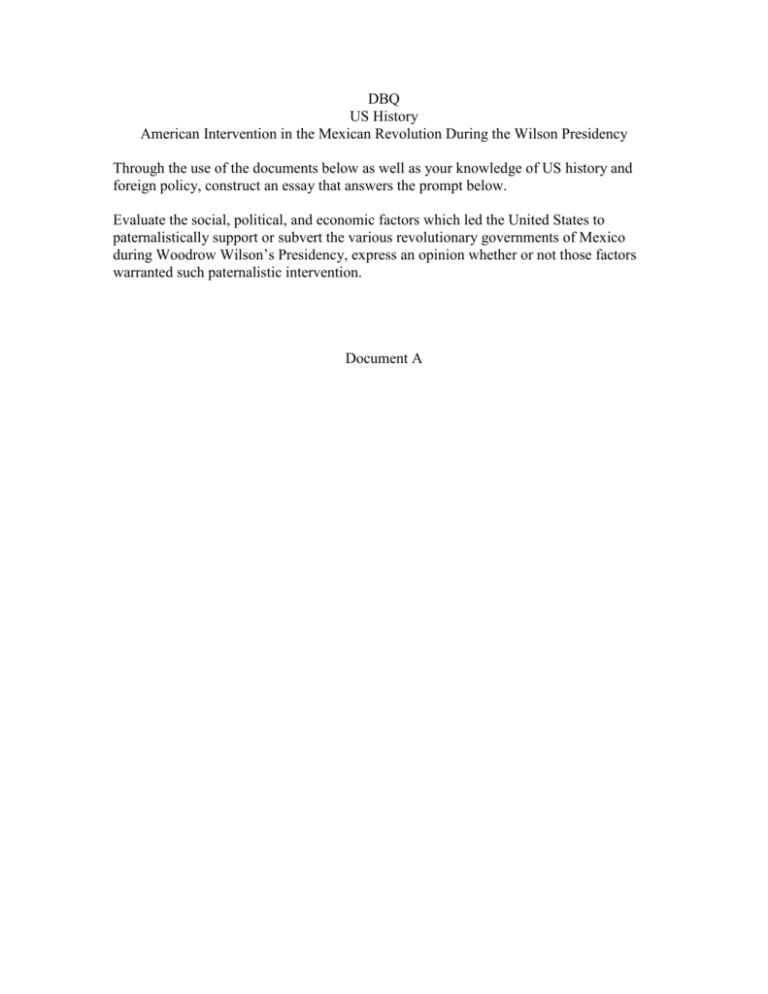
DBQ US History American Intervention in the Mexican Revolution During the Wilson Presidency Through the use of the documents below as well as your knowledge of US history and foreign policy, construct an essay that answers the prompt below. Evaluate the social, political, and economic factors which led the United States to paternalistically support or subvert the various revolutionary governments of Mexico during Woodrow Wilson’s Presidency, express an opinion whether or not those factors warranted such paternalistic intervention. Document A Courtesy of the National Archives. Document B “By 1913, about 75,000 Americans were living in Mexico as miners, engineers, merchants, and agriculturists; American investments amounted to about $1,200,000,000 -- a larger sum than that of all the other foreigners combined. Though the work of European countries, particularly Great Britain, was important, yet Mexico was practically an economic colony of the United States…… Americans had created this, perhaps the greatest of Mexican industries, and in 1913, these Americans owned nearly 80 per cent of Mexican oil…. The first diplomatic task imposed upon Page therefore was that would have dismayed a more experienced ambassador. This was to persuade Great Britain to retrace its steps, to withdraw its recognition of Huerta, and to join hands with the United States in bringing about his downfall.” Excerpt from The Life and Letters of Walter H. Page by Hendrick, Burton J. retrieved from http://net.lib.byu.edu/~rdh7/wwi/memoir/Page/Page04.htm Document C Henry Lane Wilson, U.S. ambassador to Mexico from 1910 to 1913, was born in Crawfordsville, Indiana, on 3 November 1857. He graduated from Wabash College in 1879 and married Alice Vajen in 1884, with whom he had three sons. Active in Republican politics, Wilson was appointed Minister to Chile in 1889 by President William McKinley, and worked in the foreign service under the subsequent administrations of Theodore Roosevelt and William Howard Taft, culminating with his appointment as Ambassador to Mexico by President Taft in 1910. Wilson’s tenure in Mexico City was controversial; while Ambassador, he was personally informed by General Victoriano Huerta that the general intended to overthrow President Francisco I. Madero in a coup in February of 1913; later Lane invited the anti-Madero forces to use the American embassy as the location to conclude the agreement that installed Huerta as president. Henry Wilson urged newly elected President Woodrow Wilson to recognize the Huerta government but the President, who mistrusted the Ambassador, instead intervened on the side of anti-Huerta forces. Henry Wilson was recalled to the United States in July of 1913 and forced to resign the following month. He worked for American oil interests in Latin American following his return to the private sector, and died in Indianapolis, Indiana on 22 December 1932. Note: William Kamman. “Wilson, Henry Lane”; http://www.anb.org/articles/06/0600721.html; American National Biography Online Feb. 2000. Document D Link, Arthur S., The Papers of Woodrow Wilson Vol. 27 Document E Link, Arthur S. The Papers of Woodrow Wilson vol.30 Document F The present situation in Mexico is incompatible with the fulfillment of international obligations on the part of Mexico, with the civilized development of Mexico herself, and with the maintenance of tolerable political and economic conditions in Central America. It is upon no common occasion, therefore, that the United States offers her counsel and assistance. All America cries out for a settlement. A satisfactory settlement seems to us to be conditioned on— (a) An immediate cessation of fighting throughout Mexico, a definite armistice solemnly entered into and scrupulously observed; (b) Security given for an early and free election in which all will agree to take part; (c) The consent of Gen. Huerta to bind himself not to be a candidate for election as President of the Republic at this election; and (d) The agreement of all parties to abide by the results of the election and cooperate in the most loyal way in organizing and supporting the new administration. Woodrow Wilson: Address to Congress On Mexican Affairs, 27 Aug. 1913 Document G No doubt I could do what is necessary in the circumstances to enforce respect for our Government without recourse to the Congress, and yet not exceed my constitutional powers as President; but I do not wish to act in a matter possibly of so grave consequence except in close conference and cooperation with both the Senate and House. I, therefore, come to ask your approval that I should use the armed forces of the United States in such ways and to such an extent as may be necessary to obtain from General Huerta and his adherents the fullest recognition of the rights and dignity of the United States, even amidst the distressing conditions now unhappily obtaining in Mexico. There can in what we do be no thought of aggression or of selfish aggrandizement. We seek to maintain the dignity and authority of the United States only because we wish always to keep our great influence unimpaired for the uses of liberty, both in the United States and wherever else it may be employed for the benefit of mankind. -Wilson asking for Congressional approval for military support message April 14,1914 Document H On the 9th of April a paymaster of the U. S. S. Dolphin landed at the Iturbide Bridge landing at Tampico with a whaleboat and boat’s crew to take off certain supplies needed by his ship, and while engaged in loading the boat was arrested by an officer and squad of men of the army of General Huerta. Neither the paymaster nor anyone of the boat’s crew was armed. Two of the men were in the boat when the arrest took place and were obliged to leave it and submit to be taken into custody, notwithstanding the fact that the boat carried, both at her bow and at her stern, the flag of the United States. The officer who made the arrest was proceeding up one of the streets of the town with his prisoners when met by an officer of higher authority, who ordered him to return to the landing and await orders; and within an hour and a half from the time of the arrest orders were received from the commander of the Huertista forces at Tampico for the release of the paymaster and his men. The release was followed by apologies from the commander and later by an expression of regret by General Huerta himself. General Huerta urged that martial law obtained at the time at Tampico; that orders had been issued that no one should be allowed to land at the Iturbide Bridge; and that our sailors had no right to land there. Our naval commanders at the port had not been notified of any such prohibition; and, even if they had been, the only justifiable course open to the local authorities would have been to request the paymaster and his crew to withdraw and to lodge a protest with the commanding officer of the fleet. Admiral Mayo regarded the arrest as so serious an affront that he was not satisfied with the apologies offered, but demanded that the flag of the United States be saluted with special ceremony by the military commander of the port. -Excerpt from Wilson's Address to Congress April 20, 1914 Document I Link, Arthur S, The Papers of Woodrow Wilson Vol.30. Document J Correspondence between Walter H Page and Secretary of State William Jennings Bryan regarding regime change in Mexico- Link, Arthur S, The Papers of Woodrow Wilson Vol. 30. Document K Document L Document M Document N
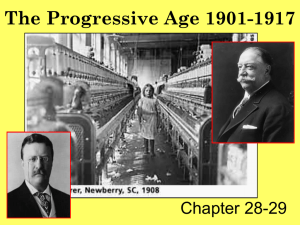
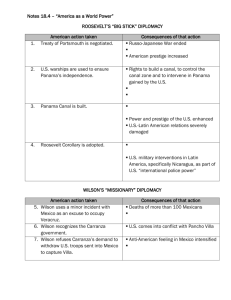
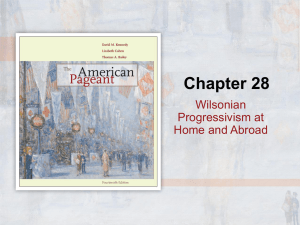

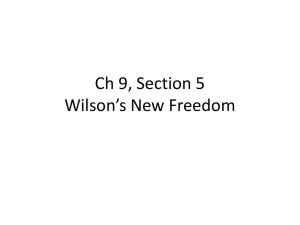
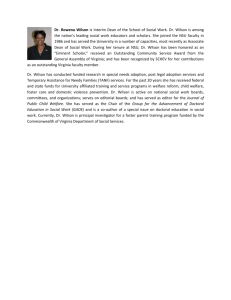


![[#OPENDS-1029] Update daily build mail subject to indicate](http://s3.studylib.net/store/data/007734190_2-d66144ca725a9119b45ca78b6568f0a8-300x300.png)